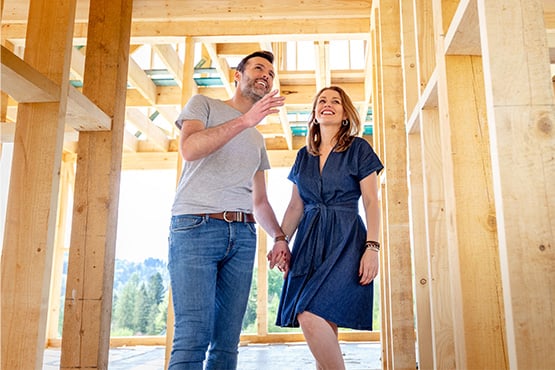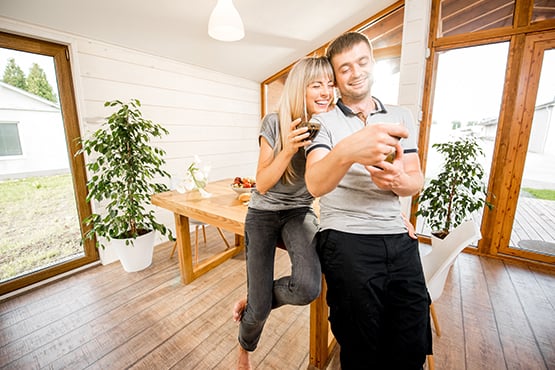Online Banking
Sign Up!
When weighing the benefits of buying vs. building a house, there’s a lot to consider. We’ll guide you step by step, so you can make the best decision for your needs, lifestyle and budget.
From cost and customization to financing options and more, let’s explore some key factors that will help you decide whether to buy or build your home sweet home!
7 Considerations for Buying vs. Building a House:
Cost
Buying an existing home often costs less because you don’t have to pay for design or construction – mostly just the down payment and closing costs. You may also be able to negotiate a lower price with the seller. But if the house needs big repairs – such as a new roof, fixed foundation or replaced HVAC system – those costs can add up fast.
Building a new home usually costs more, especially if you want custom designs. You also have to pay for land, permits and building materials. Not to mention, there could be extra costs from delays, shortages or other unforeseen circumstances. But the nice thing is that you can still mind your budget! Since you make all the decisions, from the blueprints to the backyard, you can focus on what’s important to you and adjust your spending.
If you’re looking to save money by purchasing an existing home, run the numbers with our easy mortgage calculators! They can help you estimate things like your loan amount, down payment, closing costs and what you can afford.
Market conditions
The housing market also affects what you pay for an existing home, so it’s important to consider supply and demand. If there are fewer homes and many buyers, sellers may raise prices, thinking you and others may offer above the asking price or engage in bidding wars. But in a slower market with fewer buyers, you might get a better deal.
Market conditions can impact the cost of building, too. When demand for materials and labor increases, prices tend to go up. For example, a surge in demand for steel or lumber can drive up construction costs. Additionally, labor shortages, such as strikes or a lack of skilled workers, can raise hiring costs. But if market conditions are stable, with healthy competition in the supply chain and a sufficient workforce, material and labor costs are more likely to be lower.
Loans
Securing a mortgage to buy an existing home is fairly straightforward. Most banks offer home loans with fixed interest rates, so you’ll know your monthly payments. You just won’t be able to choose the features of your home or control which properties are available during your search.
There’s a little more that goes into financing a new home build. You’ll likely need a construction loan, which is different from a regular mortgage. It often comes with more paperwork and closing costs, but it helps you get the features you want.
As you compare buying vs. building, it’s smart to begin looking at home loan options. For example, if you secure a loan through Gate City Bank to buy an existing home, you’ll enjoy local service and quick pre-approvals. And if you decide to build, we offer rate locks for up to 18 months and the option to borrow up to 90% of your lot’s value while you get ready to start construction!
Customization
Again, if you buy an existing home, there’s a good chance it won’t have all the features you want. You may have to compromise on that gourmet kitchen, open floor plan or dream reading nook. But what’s nice is that you may be able to add those features later!
On the other hand, building a house gives you the freedom to design every detail to suit your style, needs and budget – from the layout and number of bedrooms to finishes like flooring, countertops and lighting. This custom approach creates a unique home tailored to your vision. There’s just usually more time, effort and money needed to make it happen.
If you buy a home and want to renovate later, consider using a home equity loan! It’s a great way to use the value you’ve built up in your home to pay for projects.
Move-in time
Another benefit of buying a home is that you can usually move in faster, since it’s already built. The buying process can take a few weeks to a couple of months. But you’re limited to what’s available during your search.
Building a house often takes longer – from a few months to over a year, depending on the project. The journey may take some patience, but knowing that you're crafting a home that’s truly yours can make the wait feel a lot more manageable! Remember, the home will be customized how you want when you move in, better suiting your needs and style.
Location, location, location
When you buy a house, your location options are limited to where there are homes for sale. You might get lucky and find the perfect house in your favorite neighborhood! But if not, you may have to choose something else.
If you decide to build a house, one key advantage is the ability to choose from empty lots for sale. You can prioritize proximity to schools, work or recreation. But land can still be expensive and hard to find, especially in high-demand or densely populated areas. Also, costs can vary based on factors like zoning, lot size and infrastructure (e.g., roads, utilities).
Environmental impact
The environmental impact of buying an existing home largely depends on how old it is and its condition. Older homes might use more energy, which means higher utility bills and a bigger carbon footprint. But again, the upfront costs are usually lower.
When building a home, you can choose eco-friendly materials, energy-efficient appliances and designs that help reduce your carbon footprint. This can save you money on energy bills and lower your carbon footprint over time, but it usually costs more upfront.
Whether you choose to buy or build a home largely depends on your budget, timeline and personal preferences. By weighing these factors carefully, you can make the best choice for you.
We’re here to guide you home! Contact one of our knowledgeable mortgage lenders to learn more and get pre-approved today.

Discover seven essential steps for building your dream home and turning your vision into a reality!

Buying a home is one of the biggest – and best – decisions you’ll ever make. Here are 10 steps to make it simple!

You’ve been looking for the right home, carefully researching and vetting each listing. But are you prepared for the down payment? We’ve got you covered with six helpful tips!